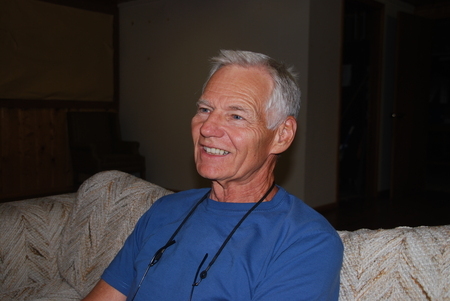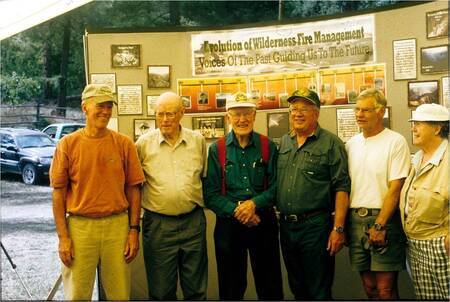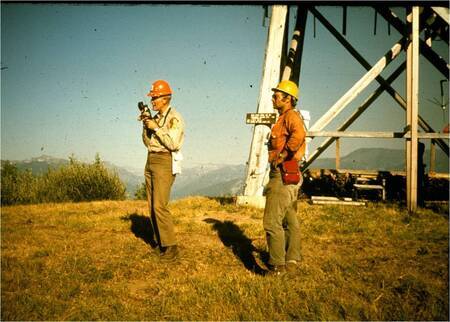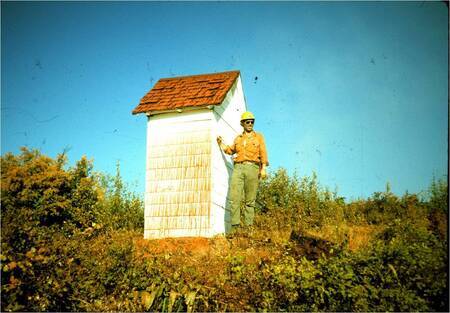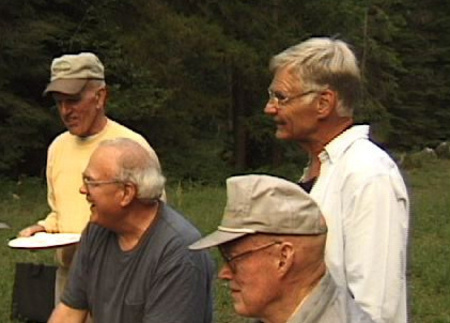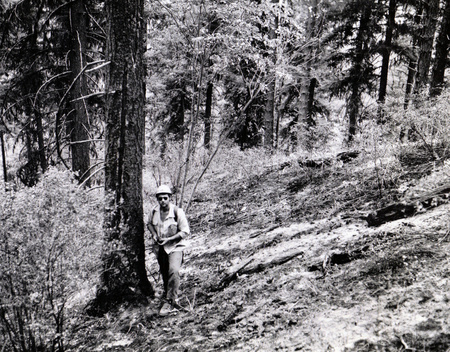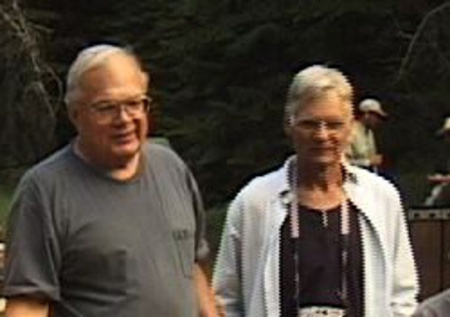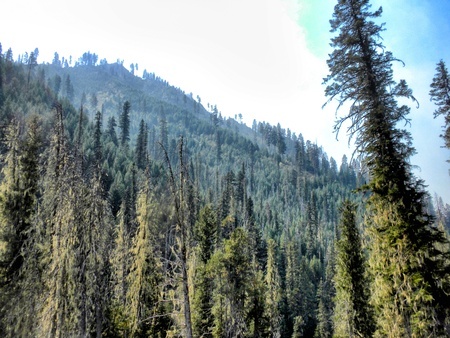Episode 29 : Paradigm Shift : an interview with Dave Aldrich and Bob Mutch Item Info
In this episode, titled, “Paradigm Shift” we hear from Dave Aldrich, who was the wilderness ranger in charge of helping to create the new fire policy in the Selway-Bitterroot Wilderness immediately following the passage of the 1964 Wilderness Act. Together with Bob Mutch and Bud Moore, Dave participated in fire studies, and in drafting the first wilderness fire policy that included naturally-occurring fires that were not suppressed, as well as studying the role fire plays in a pristine ecosystem.
Dave grew up in Missoula, Montana in a family that enjoyed outdoor recreation. After graduating from the University of Montana, with a degree in Forestry, Dave worked in Idaho and Montana managing timber resources, and also worked with the Fire School to manage forest fire in the National Forests. Since this training taught him only fire suppression, he experienced a change of thinking in order to accept the idea of allowing fire to burn in an ecosystem. For this reason, he became a natural spokesperson for teaching the public about the radical new policy.
Episode 29 : Paradigm Shift : an interview with Dave Aldrich and Bob Mutch [transcript]
00:00:00:00 - 00:00:29:25 Debbie Lee: Welcome to the Sawai Bitterroot Wilderness History Project, which is made possible by a grant from the National Endowment for the Humanities. The University of Idaho, and Washington State University. Part of the project’s mission is to collect, preserve, and make public oral histories documenting the history and people of the South. Bitterroot wilderness. For more information, please visit our website at SPW lib argue idaho.edu.
00:00:29:28 - 00:00:54:26 Debbie Lee: And then I think people, I think people get so much out of being in a wilderness setting. Once you take away cars and money and telephones, people are different and they are different to each other, I think. and and then they draw on things in themselves that maybe are a little rusty from our crazy life out here.
00:00:54:26 - 00:01:25:25 Debbie Lee: Now, I think the ways that people get along when they’re isolated in a place like that, that they place that they want to be, are really it’s a wonderful thing.
00:01:25:27 - 00:01:56:24 Debbie Lee: Thank you for joining us for the 29th episode of the South Bitterroot Wilderness History Project. In this episode titled Paradigm Shift, we hear from Dave Aldrich, who is the wilderness ranger in charge of helping to create the new fire policy in the South Bitterroot Wilderness. Immediately following the passage of the 1964 Wilderness Act. Together with Bob Mutch and Bud More, Dave participated in fire studies and in drafting the first wilderness fire policy that included naturally occurring fires that were not suppressed.
00:01:56:26 - 00:02:19:08 Debbie Lee: As well as studying the role fire plays in a pristine ecosystem. Dave grew up in Missoula, Montana, in a family that enjoyed outdoor recreation. After graduating from the University of Montana with a degree in forestry, Dave worked in Idaho and Montana managing timber resources, and also worked with the fire school to manage forest fires in the national forests.
00:02:19:11 - 00:02:35:03 Debbie Lee: Since this training taught him only fire suppression, he experienced a change of thinking in order to accept the idea of allowing fire to burn in an ecosystem. For this reason, he became a natural spokesperson for teaching the public about the radical new policy.
00:02:35:05 - 00:02:40:04 Debbie Lee: Yeah, cool. So when you were here at Powell for three years, you were here.
00:02:40:06 - 00:02:41:05 Dave Aldrich: Actually five seasons.
00:02:41:06 - 00:02:43:29 Debbie Lee: Five seasons from. Do you remember the year?
00:02:44:01 - 00:02:46:21 Dave Aldrich: Oh, yeah. 1958. second week of June.
00:02:46:23 - 00:02:47:10 Debbie Lee: Okay.
00:02:47:10 - 00:03:09:25 Dave Aldrich: Reported to little tent out of eight by 10 or 12 by ten by 12. Tent set on, a platform out behind the ranger station here. At that time, the BPR was surveying the road in the fall. It was a two lane, and it wasn’t a two lane. It was a two track road. And, they were surveying it and it was subsequently built and completed during the years I worked here.
00:03:09:26 - 00:03:19:26 Debbie Lee: Yeah. So how much contact with the survey Bitterroot wilderness. Did you, what eventually became the Solway Bitterroot? Because it wasn’t even wilderness.
00:03:19:29 - 00:03:22:01 Dave Aldrich: It was a showy wilderness, I think. Didn’t it go on to.
00:03:22:05 - 00:03:24:10 Debbie Lee: A primitive area?
00:03:24:13 - 00:03:27:20 Dave Aldrich: Yeah, yeah, for me. Very. Yeah, yeah.
00:03:27:23 - 00:03:30:03 Debbie Lee: and the Bitterroot primitive area was.
00:03:30:04 - 00:03:56:27 Dave Aldrich: Yeah. Yeah, yeah, I think they were separate. But anyway, we were aware that was there. I fought fire you know. but basically there was no wilderness program. Power Ranger District at that time was, was defacto wilderness for the most part had the Lolo Motor Trail, you know, that goes up and cuts across and, and they had, roads up, went over Papoose.
00:03:58:28 - 00:04:15:27 Dave Aldrich: I can’t say the name next, but anyway there are a few roads. They had road Elk Summit. I mean it was a, it was a pretty wild area. The road down the highway, the highway down the river went as far as Wendover Campground, which is about 3 or 4 miles down here. and then it ended. I remember coming off a small chaser fire one time.
00:04:16:03 - 00:04:37:08 Dave Aldrich: Dick Rambler took us up to top, and we went across a little motor trail and, clear up on a divide and dropped down in the post office Creek and, you know, we had no radios at that time. And the instructions were basically to put fire out. And, when you get fire put out, walk down to the deluxe, trail and walk up the river.
00:04:37:08 - 00:04:53:12 Dave Aldrich: And when you get to the end of the, the, the trail, we’ll have a vehicle come up there and check it, along about quitting time every day and see if you’re there. So we build off the top of the hill with two canteens full of water and our six meals of fish. And, you know, we’re done.
00:04:53:12 - 00:05:22:15 Dave Aldrich: Did our fire thing. And then we got finished. We fought our way down the dunes. And so we river and walked up and waited. And sure enough, somebody came down, picked us up the back. So, you know. Probably sound like a stupid way to use people, but it was, it was very is I felt very satisfied in, you know, there’s there’s a walk in the woods, and it was a fight in a fire and and, then go down and go and get to go back home, get cleaned up.
00:05:22:18 - 00:05:35:19 Debbie Lee: Yeah. Yeah. So. And then how did you get, involved in with, the, with the wilderness area, though. So a Bitterroot, later like it took.
00:05:35:19 - 00:06:04:19 Dave Aldrich: Yeah, it took six years. and I like the more broad things. what what looks right in, you know, our white captain was the epitome of that Bob for me. And it was the first thing I’d ever seen like that. Right? We had a one page document. Basically, it told us that what they want us to do is go out and, and, determine the planning procedures for allowing fire to play a natural role, more nearly natural role in wilderness.
00:06:04:21 - 00:06:11:04 Dave Aldrich: No strings, no constraints, nothing except get it done in two years, I think was our initial assignment was that.
00:06:11:11 - 00:06:13:00 Bob Mutch: You know, it was a refresher charge.
00:06:13:00 - 00:06:13:18 Dave Aldrich: Because, yeah.
00:06:13:20 - 00:06:15:29 Bob Mutch: It left a lot to one’s creativity.
00:06:16:02 - 00:06:40:07 Dave Aldrich: Well, yes. And that’s the neat thing. You know, when you write down all the stuff you want them to do, then you just want to do the job form, you know, you don’t have to think in, broad direction, you know, is, is is good because it allows people to do what needs to be done. And I hesitate to think what would have happened if we’d had a lot of specific direction on it, wouldn’t look like it does today.
00:06:40:07 - 00:06:42:00 Dave Aldrich: I know, interesting.
00:06:42:02 - 00:06:57:08 Bob Mutch: Yeah. You know, people start to write their own biases into the direction and then you find doors shut. That should be open at the beginning. And we found in we, Dave, that the doors were open to take this. And any avenue that made sense.
00:06:57:11 - 00:07:28:10 Dave Aldrich: Absolutely. and that was probably that was the most exciting time in my professional career. When we had that, I didn’t understand why, but we were given. Here’s what right looks like. This is what we want to have at the end of it, a guidebook on doing this kind of thing. And given our budget to go to talk to anybody we wanted to and do anything, and we got great support.
00:07:28:12 - 00:07:42:15 Dave Aldrich: Yeah. No, you know, well, we got Jim back. You know, we had him under contract. we got involved with the soils in the watershed. People, the ecologist group and in, Fisheries and Wildlife and.
00:07:42:18 - 00:07:52:02 Bob Mutch: Doris Milner and the Montana Wilderness Association. We could go anywhere for anybody. Idaho Fish and Game and their ideas.
00:07:52:04 - 00:07:55:27 Debbie Lee: So, you’re going to have to get back to. Oh, what year was this?
00:07:55:28 - 00:07:58:24 Dave Aldrich: Oh. I’m sorry. Okay. I jumped from 19.
00:07:58:24 - 00:08:03:11 Debbie Lee: That’s okay. You can jump as long. As long as I know what you’re you’re talking okay right now.
00:08:03:12 - 00:08:26:08 Dave Aldrich: I did the timber thing till 1967. Yeah. And no, 70. I’m sorry. I did it from 67 to 70. and, my boss came in one day to do my annual reading, and he threw a flier on my desk, and he said, you like fire. You might want to take a look at this. And after he finished my evaluation, I went ahead and read it.
00:08:26:11 - 00:08:40:26 Dave Aldrich: And it was the advertisement says, we want somebody to come in and do the the Wilderness first study. And it was a one page thing. I was talking about. And I went home, showed it to my wife. And, you know, she said, whatever you want to do, you know, I can I think that’s I want to do that.
00:08:40:26 - 00:08:57:02 Dave Aldrich: So replied and, and I got accepted for it. So that was, a monumental thing, that I had no idea about. You know, it’s like walking in a door that you’ve never seen before because I opened the door, there was a brand new world out there.
00:08:57:04 - 00:09:06:16 Debbie Lee: So the, the the, flier was to apply to, Montana after Bud region one. Region one. And he. And was it bud more that you were applying?
00:09:06:23 - 00:09:29:14 Dave Aldrich: Well, no, it didn’t in indirectly. it was, flown advertised by the bidder at National Forest and, Orville Daniels. Was it for a supervisor on that forest at that time? Bob Graham was a fire person, and we were not directly assigned to the fire. Yeah, we were to be facilitated by the financial. And, So Orville was our whole man.
00:09:29:14 - 00:09:36:24 Dave Aldrich: Orville was a person that we went to for for a lot of conversation, guidance to bounce things off with and that sort of thing.
00:09:36:26 - 00:09:41:23 Debbie Lee: So were you two the ones that were responsible for kind of setting the agenda?
00:09:41:26 - 00:09:42:09 Dave Aldrich: Yes.
00:09:42:14 - 00:09:44:10 Debbie Lee: And how did you do that one?
00:09:44:15 - 00:10:07:06 Bob Mutch: Well, Dave was really his one page in Idaho. There was a guy in reserve in Montana reading his one page same flier and one day having his epiphany about, oh my God, this is the finest job I ever heard of. And so instead of hiring one, they hire both of us. Then they did. They did hire one, but it was still what they did.
00:10:07:06 - 00:10:26:22 Dave Aldrich: The, research, the fire furlough basically paid your salary, but we we had the money in the white cap program to your travel and those kinds of thing. But Bob can tell you more about those ranges than I. But but we had Bob, you know, 24 over seven for three years.
00:10:26:24 - 00:10:37:07 Debbie Lee: So how did you like how did you approach this assignment? What were some of the things that you set up for yourself to do that either succeeded or failed?
00:10:37:10 - 00:10:47:12 Dave Aldrich: Well, I guess you know, the first thing, when I went to apply, I thought a little bit about it, you know, because I had a couple, three weeks before I had my interview.
00:10:47:16 - 00:10:49:00 Debbie Lee: This was in 1970.
00:10:49:04 - 00:11:10:15 Dave Aldrich: Yes. Okay. Like me, something like that. and, as I drove over from Elk River, Idaho to Hamilton, Montana, for the interview, I, I thought, well, you know, we were into this pre-planning, designating places where we’re going to control fires and actually doing line construction ahead of it, you know, so that we had a place to anchor and fight fires.
00:11:10:15 - 00:11:36:10 Dave Aldrich: And I, I see this big pre-planning exercise going on in, in fire, strictly a mechanical control approach to it. And when I got the job and that bob much the first day, he opened the window I was looking at the world is like looking at a baseball game through a knothole. and he put me in the stadium.
00:11:36:12 - 00:11:59:04 Dave Aldrich: He introduced me to some fire ecology, and he gave me, a lot of reading to do about fire that I had not an inkling of thought existed. And so everything that I brought, all my preconceived things were in the air. And, you know, Bob.
00:11:59:06 - 00:12:30:18 Dave Aldrich: Bob and I were partners, but Bob with Bob was the leader at that point. There is no question about it. He was. You had resources that were totally unknown to me, and I spent all the time I worked with him getting teams from Bob, you know, out of, journals and but but even more important, my, my, political, academic world or whatever, my, my, my concepts for the hole in the fence.
00:12:30:18 - 00:12:31:24 Dave Aldrich: Look, you.
00:12:31:27 - 00:12:44:29 Debbie Lee: Can you remember any in particular that were like moments for you? You mentioned fire ecology and that particularly, changed your thinking.
00:12:44:29 - 00:13:16:01 Dave Aldrich: Well, yeah, there were, there were a bunch of ecologists, Bob, and send abstracts down. And Kilgore had done a lot of writing, Bud Heintzelman had some stuff. who was the guy at, they had the experimental burn we saw in Sequoia, Kings Canyon, the old gray haired doctor. Well, visual, visual. Harold Boswell, Bob started dropping ecological monographs on me that, that I read in in the made sense.
00:13:16:01 - 00:13:29:08 Dave Aldrich: That was a scary thing, you know, but but they were they were brand new world to me. So my my growth curve, learning curve or whatever you want to call it was vertical for, for a long time.
00:13:29:12 - 00:13:30:12 Debbie Lee: Yeah.
00:13:30:15 - 00:13:53:22 Dave Aldrich: And we did Bob. Bob set the Sequoia Kings Canyon, trip up and we went to there and, got to listen to more ecological things, but, but basically, we got a flight, right? And on, on a flight, we, observed, saw located. I guess you’d say that a fire that, it was burning in the park and became one of their let burn fires.
00:13:53:25 - 00:14:09:20 Dave Aldrich: It turned out to be, I think their their largest fire that they had during the period of, the programs they had down there. And, you know, I came back, I tell you what, boys on steroids, I just I don’t know what’s going to happen. So, you know, in a period of very short period, I’m talking about weeks.
00:14:09:23 - 00:14:31:16 Dave Aldrich: I went from, well, we’ll do this pre attack planning. And you know, we can go out and burn it out or you know like kind of saying to one of here’s this thing called fire. It’s a part of the part of the ecosystems out here. And had been for evolutionary time and interactions between plants and things that are going on on the, on the ground, that kind of thing.
00:14:31:19 - 00:14:52:01 Dave Aldrich: So I tell you what, boy, I, I just, I was learning and learning fast and liking it. And Bob, we went we came out to the white cavalry to he took a trip very, very quickly after we, we, we got assigned to go out and look at the delay, get the lay of the land and place where we could get away from telephones and people and that kind of.
00:14:52:04 - 00:15:11:02 Dave Aldrich: I what problems? You know, I had that there were expectations thing. We had a two year, drop dead time on the program initially. And, you know, I began to worry because I could I could see there was so much to, assimilate. Go ahead. You had a.
00:15:11:02 - 00:15:31:24 Bob Mutch: No, no. All I was going to say is that, you know, I felt the same way if you let yourself, you could feel overwhelmed couldn’t you. Yeah. So many pieces to put together. But yeah we just two people instead of one. I thought it was a huge advantage Dave, that you representing National Forest Systems, the management side of the forest Service.
00:15:31:24 - 00:15:45:03 Bob Mutch: And I could represent the research side and knowledge and information and fire ecology and bring those two together. And I for me, it helped melt some of these huge expectations for something that was doable.
00:15:45:08 - 00:16:02:21 Dave Aldrich: Well, and I think that’s right. I know. That’s right. we would never have gone where we went had I had to do it myself. There’s no question about that. But we did go to Paradise Cabin. Yes. And when we went up to Cooper’s flat and spent some time and walked up on the mountain, we I think we went up on the North Slope there.
00:16:02:23 - 00:16:02:29 Dave Aldrich: Yeah.
00:16:03:02 - 00:16:06:02 Debbie Lee: Well, what were you guys looking for when you did that first trip?
00:16:06:05 - 00:16:32:27 Dave Aldrich: I think we were. I was just right. It had to get out of the cabin. Had to to get out and get in on the on the area and look out a little bit. but it, it was just a very comfortable and easy way to have these dialogs about what we were looking at, and what we might be seeing two years down the road.
00:16:32:29 - 00:17:02:08 Dave Aldrich: And that became one of the things that Bob kind of directed us and drafted a lot of his work toward was and was understanding the fire history, the fire frequency in different ecosystems, things like that. But you know, there’s this poor dumb forester comes out with a, you know, a very mechanical looking at it, doing different things. And, and suddenly here, all these variables interrelated variables that that have to be put into some kind of a context in order to deal with them.
00:17:02:10 - 00:17:19:17 Dave Aldrich: And, it was, it was the greatest time in my life, you know, it was a time that, I wouldn’t trade it for anything but a very, very changing in me, too, I think in terms of my personal life, too, you know, the way I looked at it changed so.
00:17:19:20 - 00:17:23:01 Debbie Lee: Well, can in what way can you give me an example?
00:17:23:03 - 00:17:41:06 Dave Aldrich: Well, it. Yeah, I was very, What would you call it? I go and go and down a hallway and, basically took the walls away and began to look at everything more broadly with more, more acceptance, I think.
00:17:41:08 - 00:18:08:10 Debbie Lee: Thank you for joining us for this episode of the Selway Bitterroot Wilderness History Project, which has been made possible by the National Endowment for the Humanities, the University of Idaho, and Washington State University. The project coordinator is Debbie Lee, recorded and produced by Aaron Jepson.
Gallery
- Title:
- Episode 29 : Paradigm Shift : an interview with Dave Aldrich and Bob Mutch
- Creator:
- Debbie Lee; Dave Aldrich; Bob Mutch
- Date Created (ISO Standard):
- 2011-07-16
- Description:
- Interviewee: Dave Aldrich and Bob Mutch | Interviewer: Debbie Lee | Location: Powell, Idaho | Date: July 16, 2011 | In this episode, titled, 'Paradigm Shift' we hear from Dave Aldrich, who was the wilderness ranger in charge of helping to create the new fire policy in the Selway-Bitterroot Wilderness immediately following the passage of the 1964 Wilderness Act.
- Subjects:
- podcasts fire fire management fire suppression firefighting wilderness act fire policy
- Section:
- Wilderness Voices
- Location:
- Selway-Bitterroot Wilderness (Idaho and Mont.)
- Publisher:
- Wilderness Voices, The Selway-Bitteroot Wilderness History Project, https://selwaybitterrootproject.wordpress.com/
- Original URL:
- https://selwaybitterrootproject.wordpress.com/2012/09/05/paradigm-shift/
- Source Identifier:
- Selway-Podcast-ep29
- Type:
- Sound
- Format:
- audio/mp3
- Language:
- eng
- Preferred Citation:
- "Episode 29 : Paradigm Shift : an interview with Dave Aldrich and Bob Mutch", The Selway-Bitterroot Wilderness History Project, University of Idaho Library Digital Collections, https://www.lib.uidaho.edu/digital/sbw/items/sbw311.html
- Rights:
- Copyright: The Selway-Bitteroot Wilderness History Project. In Copyright - Educational Use Permitted. For more information, please contact University of Idaho Library Special Collections and Archives Department at libspec@uidaho.edu.
- Standardized Rights:
- http://rightsstatements.org/vocab/InC-EDU/1.0/

